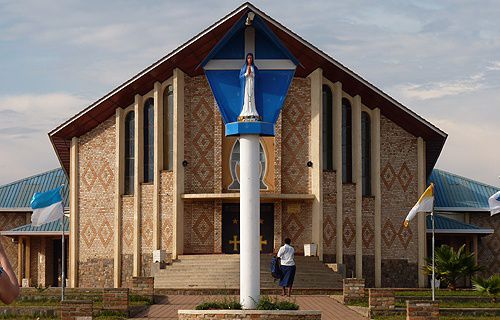Meeting with the Rwandan bishops for their ad limina visit Thursday, Pope Francis urged them to be be agents of reconciliation, commending them to the Marian apparition at Kibeho, in the country's south. “Rwanda will in a few days commemorate the 20th anniversary of the horrible genocide which has brought such suffering and wounds, which are still far from healed,” the Pope said April 3 at the Vatican. “I join with all my heart in mourning, and I assure you of my prayers for yourselves, for your often torn communities, for all victims and their families, for all Rwandans, without distinction of religion, ethnicity, or political affiliation.” April 7, 1994 was the first of 100 days during which Hutus in Rwanda massacred their Tutsi neighbors. Up to 1 million Rwandans were killed, most of them Tutsi. “I commend you all to the maternal protection of the Virgin Mary,” Pope Francis told the nation's bishops. “I sincerely hope that the Shrine of Kibeho might radiate even more the love of Mary for her children, especially the poorest and most injured, and be for the Church in Rwanda, and beyond, a call to turn with confidence to Our Lady of Sorrows, who accompanies each of us on our way that we might receive the gift of reconciliation and peace.” He noted that reconciliation and healing “certainly remain the priority of the Church in Rwanda. I encourage you to persevere in this endeavor, for which you have already taken a number of initiatives.” “Forgiveness of sins and genuine reconciliation, which may seem impossible to human sight after such suffering, are however a gift of Christ that it is possible to receive, though a life of faith and prayer, even if the road is long and requires patience, dialogue, and mutual respect.” Because of this, the Bishop of Rome said, the Church “has an importance place” in the rebuilding of Rwandan society, with hope “bearing witness to the truth.” He noted the catholicity of the Church, saying it can “overcome prejudice and ethnic divisions” when it “speaks with a sole voice.” Pope Francis noted the upcoming 50th anniversary of diplomatic relations between Rwanda and the Holy See, highlighting the importance of building up the common good around the values of human dignity, justice, and peace. “Do not be afraid to highlight the irreplaceable contribution of the Church to the common good,” he told them. “I know that the work done, in particular with regards to education and health, is considerable.” “The education of youth is the key to the future in a country where the population is renewed quickly,” Pope Francis reflected. “It is therefore the duty of the Church to form children and young people in Gospel values, which they shall find especially in a particular familiarity with the Word of God, which will be for them like a compass indicating the route to follow.” He added that it is thus important that Catholic schools combine their “educational mission and the explicit announcement of the Gospel,” saying “these should never be separated.” The Pope encouraged good formation for the laity, saying they play a crucial role in evangelization and reconstruction, and for families, saying children must learn there “the authentic Christian values of integrity, fidelity, honesty and self-giving, which permit one to know true happiness, after the heart of God.” He told the bishops to care particularly for their priests, and for the formation of their seminarians. “Dear Brothers, I assure you again of my affection for you, for your diocesan communities, for all of Rwanda,” Pope Francis concluded. Entrusting them to Mary, he reminded them that she “appeared in your country to children, reminding them of the efficacy of fasting and of prayer, in particular the recitation of the Rosary.”

